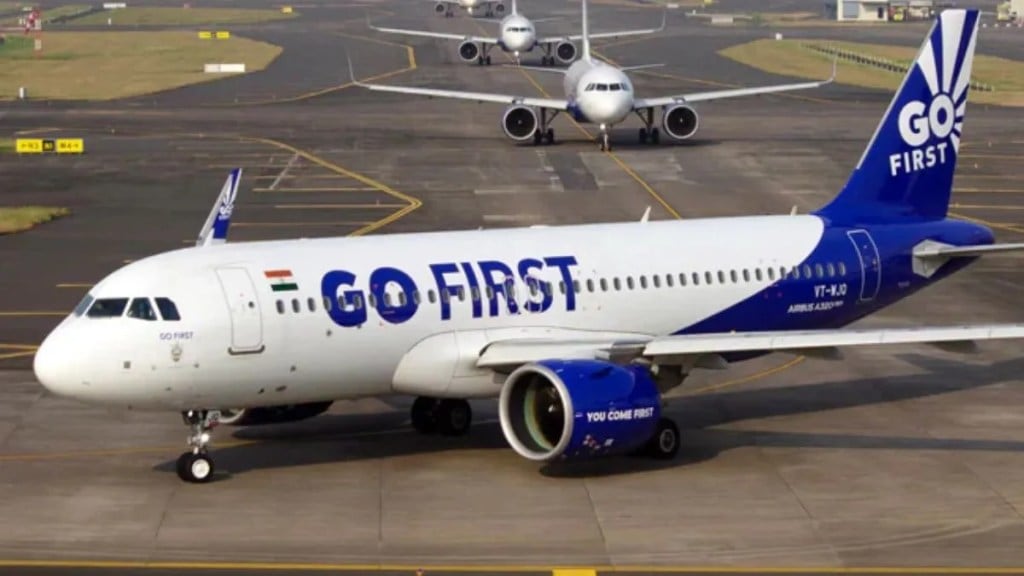Wadia Group-controlled Go First has filed for insolvency proceedings with the National Company Law Tribunal (NCLT), blaming US-based Pratt & Whitney (P&W) engines for the grounding of about half its 50-strong fleet.
The insolvency filing marks the first major airline collapse in the country since Jet Airways filed for bankruptcy in 2019.
Earlier in the day, the troubled low-cost airline suspended all flights for May 3 and May 4 amid a severe fund crunch. The move invited a show-cause notice from the Director General of Civil Aviation as to why actioncivil should not be initiated for violation of Aircraft Rules 1937.
The government seems to have taken a sympathetic view of the airline’s woes. Civil aviation minister Jyotiraditya Scindia said it was unfortunate that the “operational bottleneck issue has dealt a blow to the airline’s financial position” and that it was “prudent to wait for the judicial process to run its course”.
Scindia said the government has been assisting the airline in every possible manner and the matter has been taken up with the stakeholders involved. He advised Go First to make alternative travel arrangements for passengers, so that inconvenience was minimal.
Go First’s lenders were unaware of the airline’s plan to file for voluntary insolvency, two bankers told news agency Reuters.
In its statement, Go First said non-supply of engines from P&W resulted in an income loss of ₹10,800 crore and expenses totalling ₹1,600 crore towards lease rent for non-operational grounded aircraft.
Go First also sued P&W in a Delaware court on Tuesday. The emergency petition seeks enforcement of two arbitral awards that require P&W to immediately supply the engines for its Airbus 320 aircraft to help it continue operations.
“It is an unfortunate decision but had to be done to protect the interest of the company,” news agency PTI quoted the airline’s CEO Kaushik Khona as saying.
Go First claimed that it had been forced to apply to the NCLT after P&W refused to comply with an award issued by an emergency arbitrator. The order directed P&W to dispatch at least 10 serviceable spare leased engines by April 27 and a further 10 spare leased engines per month until December, Go First said.
To recover these and other losses, Go First has sought compensation of around ₹8,000 crore in the arbitration. If the company is successful in the arbitration, it is hoped that it will be able to address the liabilities of all its creditors.
“The additional consequence of P&W’s actions has also driven some lessors to repossess aircraft, draw down letters of credit and notify further withdrawal of aircraft. The culmination of these actions will result in a severe depletion in the number of aircraft available for Go First to operate going forward, thereby making it further unfeasible for the company to continue its operation and meet its financial obligations,” the company further added.
The percentage of Go First’s grounded aircraft due to faulty engines has grown from 7% in December 2019 to 31% in December 2020 and 50% in December 2022.
Sabina Chopra, COO, corporate travel and head Industry relations, Yatra.com, said, “Go First flights for 3rd and 4th May are unavailable, while flights from 5th May onwards are available. We are continuously following up with the airline and are awaiting an update from their end on rescheduling and refunds.”
While engines are creating operational problems, financial woes are bleeding the airline. Last financial year Go First recorded its biggest-ever loss at ₹1,808 crore on a revenue of ₹4,184 crore which was the lowest since 2018. The company has a negative net worth of ₹3,222 crore, as per disclosures made by it for FY22.
The Mumbai-based airline has been battling its worst-ever crisis since its inception in 2005. Not only has it struggled to raise working capital to pay employee salaries and for the fuel to power its aircraft, investors have remained unconvinced about its turnaround plans due to challenges around continued erosion in market share and poor flight punctuality.
Its average market share between January and March stood at 7.8%, which is the lowest in seven years. From 260 flights a day in 2019, Go First’s tally dropped to 200 flights per day in January and February, as per data sourced from the DGCA. The company had plans to increase the daily departures to 400 by the start of April.

